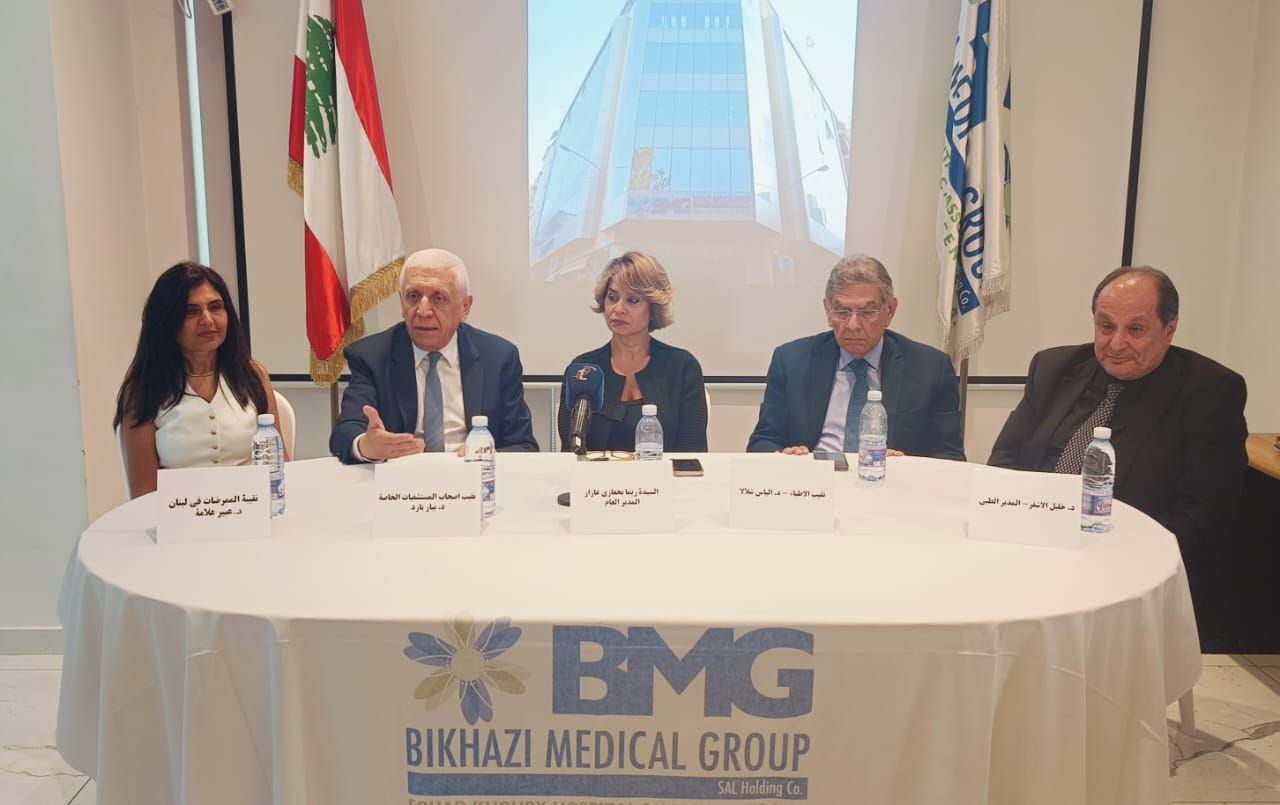
Lebanese healthcare professionals took the floor during a press conference in Beirut to lay bare what they describe as the acute difficulties facing their sector. Doctors under fire, nurses in exodus, hospitals struggling with severe structural constraints – an alarm has been sounded.
“Have you ever thought about the suffering of hospitals?”
That poignant question opened the press conference held on Thursday in Beirut by the Bikhazi Medical Group (BMG). In front of a crowd of journalists and healthcare professionals, hospital and union officials laid out, without sugarcoating, the suffering of a sector in crisis.
A Hospital’s Cry from the Heart
Rima Bikhazi, the General Director of BMG, began with a speech filled with gravity:
“This initiative is above all a cry from the heart to society. Behind the walls of hospitals are human beings fighting every day, often in complete indifference.”
A Constant Trial
Dr. Khalil Achkar, the Medical Director of the facility, denounced a worrying trend:
“At every medical complication, the doctor becomes the designated culprit. His name is published in full, as if he were a criminal – even though in other cases, the identities of suspects are protected.”
He reminded attendees that hospitals have stood firm during the worst crises – the Beirut Port explosion, the Covid-19 pandemic – and in times of war:
“We kept treating and saving lives, sometimes without electricity or supplies. And still, accusations fly.”
Nurses: The Forgotten Pillars of the System
During the public address, the voice of Abir Alameh, the President of the Lebanese Order of Nurses, resonated like a cry for help:
“Who’s at the patient’s bedside day and night? Who comforts families, provides care, teaches, conducts research? Nurses. And yet, they are the first to be neglected.”
She denounced the unbearable situation faced by nurses: miserable wages, overwhelming workloads and a massive exodus.
“Because of these precarious conditions, we’ve lost a precious part of our workforce. Those who remain are under enormous pressure, which inevitably affects the quality of care.”
Nurses on the Verge of Collapse
Alameh’s testimony painted one of the harshest realities of Lebanon’s nursing sector. Facing war-related trauma, chronic understaffing and a lack of psychological support, many caregivers are now expressing exhaustion.
In this toxic context, Dr. Elias Chelala, the President of the Lebanese Order of Physicians, stepped up to call for a shift in perspective:
“Yes, doctors have duties and obligations. They must avoid mistakes and uphold medical confidentiality. But we cannot dismiss their enormous contribution to keeping the health system running.”
He spoke about the human sacrifices made by healthcare workers on the front lines of every crisis:
“During Covid, after the August 4 blast, when hundreds of patients poured in, and during the ‘pagers’ episode – those explosive devices marking the start of the Israeli offensive of September 2024 – caregivers did everything they could to treat patients with severed limbs, disfigured faces, across all regions of Lebanon.”
During the last Hezbollah–Israel war, doctors also answered the call of duty with rare skill and devotion.
Chelala regretted that such sacrifices are quickly forgotten and accusations are thrown recklessly:
“There’s a dangerous trend of casting the doctor as a murderer – without evidence, without reflection. The press too often jumps to unfounded accusations, destroying reputations before any verification.”
He also addressed the silent but devastating crisis within the nursing profession:
“We are witnessing a real hemorrhage. Hôtel-Dieu de France has lost half of its nurses. The cliché that doctors are living in luxury is false. Many are now struggling to make ends meet.”
Insurance: A Broken System
On the topic of insurance, Chelala exposed a chaotic situation:
“In theory, they should pay within 90 days. In practice, it’s six to ten months. How can the system possibly survive like that?”
Private Hospitals: Trapped Between Mistrust and Survival
Pierre Yared, the President of the Private Hospitals Syndicate, used the opportunity to denounce the prevailing hypocrisy:
“Public opinion is programmed against us. We’re accused of greed, yet in times of crisis, those same people come knocking on our doors.”
He listed the daily dysfunctions strangling hospitals:
• Unchanged hospital tariffs since 1990;
• Reimbursement delays from the National Social Security Fund (CNSS);
• Lack of subsidies from the Central Bank of Lebanon;
• Skyrocketing fuel costs;
• The burden of running power generators.
Yared further highlighted the double standards at play: “Just operating a hospital has become a logistical nightmare. And yet, people expect perfect service.”
Several speakers emphasized the urgency of state intervention to prevent the collapse of the private hospital system, which remains a central pillar of healthcare in Lebanon.
Yared wanted to set the record straight:
“Yes, hospitals must generate profits. Not to get rich, but to renew equipment, raise salaries – especially for nurses. It’s a necessity in every country in the world.”
He concluded with a note of clear-eyed hope:
“Lebanon is a medical beacon in the region. It must remain one.”
A System on Life Support
More than just a press interaction, the conference served as a collective plea. Healthcare workers are not asking for immunity or privileges – they’re asking for respect, justice and structural support.
The state, as guardian of the public good, is now being called to act not just as an arbiter but as a partner in rescue, offering a budgetary and logistical response that matches the urgency.
Without immediate reforms, Lebanon’s hospital system risks collapse – and with it, a major part of the nation’s dignity.




Comments